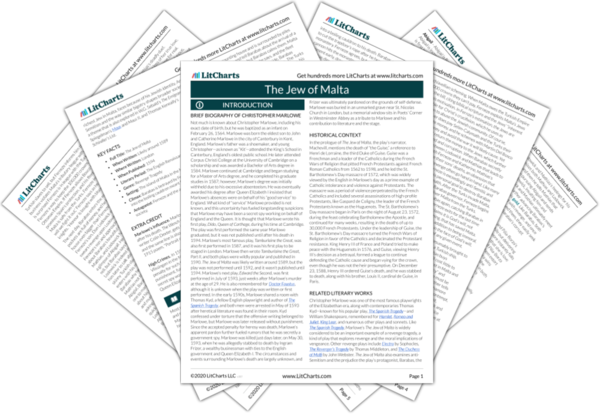Machiavellianism Quotes in The Jew of Malta
Prologue Quotes
Admired I am of those that hate me most.
Through some speak openly against my books,
Yet will they read me, and thereby attain
To Peter’s chair: and when they cast me off,
Are poisoned by my climbing followers.
I count religion but a childish toy,
And hold there is no sin but ignorance.
But whither am I bound, I come not, I,
To read a lecture here in Britaine,
But to present the tragedy of a Jew,
Who smiles to see how full his bags are crammed,
Which money was not got without my means.
I crave but this, grace him as he deserves,
And let him not be entertained the worse
Because he favours me.
Act 1, Scene 2 Quotes
Out wretched Barabas,
Sham’st thou not thus to justify thyself,
As if we knew not thy profession?
If thou rely upon they righteousness,
Be patient and thy riches will increase.
Excess of wealth is cause of covetousness:
And covetousness, oh, ‘tis a monstrous sin.
Ay, policy? That’s their profession,
And not simplicity, as they suggest.
The plagues of Egypt, and the curse of heaven,
Earth’s barrenness, and all men’s hatred
Inflict upon them, thou great Primus Motor.
And here upon my knees, striking the earth,
I ban their souls to everlasting pains
And extreme tortures of the fiery deep,
That thus have dealt with me in my distress.
Act 2, Scene 3 Quotes
Yonder comes Don Mathias, let us stay;
He loves my daughter, and she holds him dear:
But I have sworn to frustrate both their hopes,
And be revenged upon the—(Governor).
Barabas: Hast thou no trade? Then listen to my words,
And I will teach that shall stick by thee:
First be thou void of these affections,
Compassion, love, vain hope, and heartless fear,
Be moved at nothing, see thou pity none,
But to thyself smile when the Christians moan.
Ithamore: Oh brave, master, I worship your nose for this.
Act 3, Scene 2 Quotes
Oh bravely fought, and yet they thrust not home.
Now Lodowick, now Mathias, so;
So now they have showed themselves to be tall fellows.
Act 3, Scene 3 Quotes
Ithamore: Oh mistress! I have the bravest, gravest, secret, subtle, bottle-nosed knave to my master, that ever gentleman had.
Abigail: Say, knave, why rail’st upon my father thus?
Ithamore: Oh, my master has the bravest policy.
Act 3, Scene 4 Quotes
Stay, first let me stir it Ithamore.
As fatal be it to her as the draught
Of which great Alexander drunk, and died:
And with her let it work like Borgia’s wine,
Whereof his sire, the Pope, was poisonèd.
In a few, the blood of Hydra, Lerna’s bane:
The juice of hebon, and Cocytus’ breath,
And all the poisons of the Stygian pool
Break from the fiery kingdom; and in this
Vomit your venom, and envenom her
That like a fiend hat left her father thus.
Act 3, Scene 6 Quotes
Bernardine: Know that confession must not be revealed,
The canon law forbids it, and the priest
That makes it known, being degraded first,
Shall be condemned, and then sent to the fire.
Abigail: So I have heard; pray therefore keep it close,
Death seizeth on my heart, ah gentle friar
Convert my father that he may be saved,
And witness that I die a Christian.
Bernardine: Ay, and a virgin too, that grieves me most:
But I must to the Jew and exclaim on him,
And make him stand in fear of me.
Act 5, Scene 2 Quotes
Oh fatal day to fall into the hands
Of such a traitor and unhallowed Jew!
What greater misery could heaven inflict?
Away, no more, let him not trouble me.
Thou hast thou gotten, by thy policy,
No simple place, no small authority,
I am now Governor of Malta; true,
But Malta hates me, and in hating me
My life’s in danger, and what boots it thee
Poor Barabas, to be the Governor,
Whenas thy life shall be at their command?
No Barabas, this must be looked into;
And since by wrong thou got’st authority,
Maintain it bravely by firm policy,
At least unprofitably lose it not:
For he that liveth in authority,
And neither gets him friends, nor fills his bags,
Lives like the ass that Aesop speaketh of,
That labours with a load of bread and wine,
And leaves it off to snap on thistle tops:
But Barabas will be more circumspect.
Begin betimes, Occasion’s bald behind,
Slip not thine opportunity, for fear too late
Thou seek’st for much, but canst not compass it.
Within here.
And thus far roundly goes the business:
Thus loving neither, will I live with both,
Making a profit of my policy;
And he from whom my most advantage comes,
Shall be my friend.
This is the life we Jews are used to lead;
And reason too, for Christians do the like:
Well, now about effecting this device:
First to surprise great Selim’s soldiers,
And then to make provision for the feast,
Then at one instant all things may be done,
My policy detests prevention:
To what even my secret purpose drives,
I know; and they shall witness with their lives.
Act 5, Scene 5 Quotes
Content thee, Calymath, here thou must stay,
And live in Malta prisoner; for come call the world
To rescue thee, so will we guard us now,
As sooner shall they drink the ocean dry,
Than conquer Malta, or endanger us.
So march away, and let due praise be given
Neither to fate nor fortune, but to heaven.












